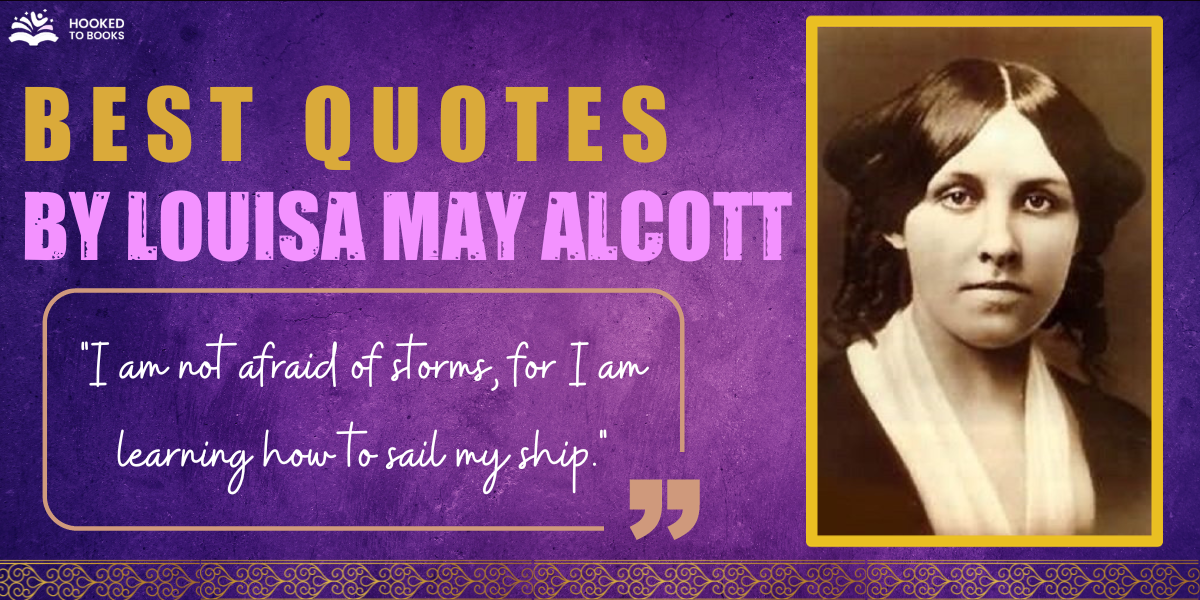Louisa May Alcott was one of the famed authors of the 19th century who wrote a famous classic novel, Little Women, that surpassed societal norms and narrated the stories of strong female heroines.
Little Women was highly inspired by her life, creating a history. After the success of the novel, she wrote many other books.
All of her books contain a lot of inspiring quotes and phrases, and in this article, I have compiled 15 best quotes by Louisa May Alcott.
Together, let’s reminisce about the author whose work inspired so many.
15 Quotes by Louisa May Alcott
Reminiscing beautiful, inspiring, and motivational quotes from a book is fun and relaxing. I have compiled the 15 best quotes by the author of Little Women. Have a look!
“I am not afraid of storms, for I am learning how to sail my ship.”
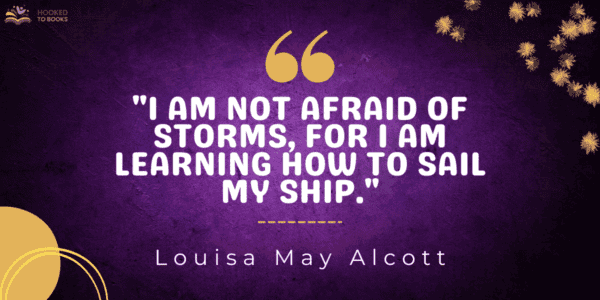
This quote by Louisa May Alcott beautifully conveys a message of courage and resilience in the face of life’s challenges.
It suggests that instead of fearing difficult or turbulent times, we should embrace them as opportunities for personal growth and learning.
Just as a sailor learns to navigate and conquer storms at sea, we, too, can acquire the skills and strength needed to overcome adversity.
It’s a reminder that every hardship we face can be a valuable lesson that helps us become stronger and more capable individuals.
By facing our fears and challenges head-on, we can grow and develop, ultimately steering our lives toward calmer waters and brighter horizons.
“The power of finding beauty in the humblest things makes home happy and life lovely.”
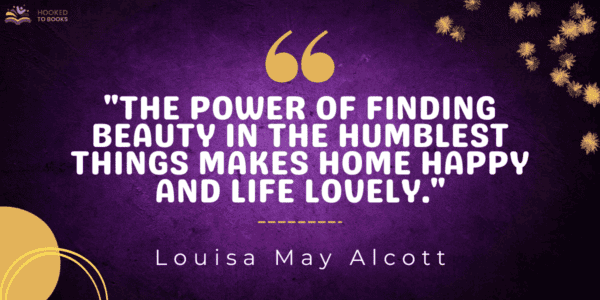
This quote beautifully emphasizes the significance of appreciating simple, everyday moments. It tells us that by recognizing and cherishing the beauty in even the most ordinary things, we can create a joyful and contented home life.
Rather than seeking grand or extravagant experiences, it suggests that a happy and lovely life can be found in small, humble details of our daily existence.
Whether it’s the warmth of a cup of tea, the laughter of loved ones, or the beauty of a sunset, these simple pleasures hold the power to fill our lives with joy and make our homes a source of comfort and happiness.
It’s a reminder to find beauty in the little things and to savor the sweetness of life’s everyday moments.
“Love is a great beautifier.”
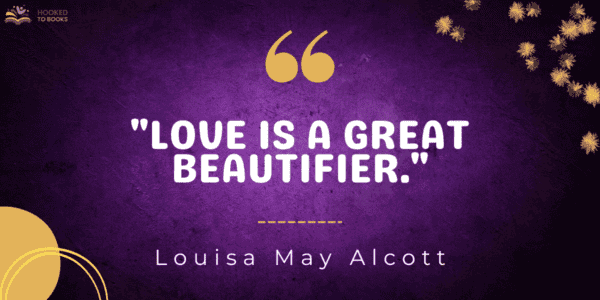
The quote encapsulates the transformative power of love. It conveys the idea that love can enhance and magnify the beauty within and around us.
When we love and are loved in return, our inner radiance shines brighter, making us appear more attractive to others. Moreover, love has the magical ability to make even the simplest things and moments seem more beautiful and meaningful.
It helps us see the goodness in people and the world, making life’s experiences more enchanting.
In essence, love is like a gentle brush that paints the world with brighter colors and our hearts with greater splendor, making life more beautiful and fulfilling.
“I’d rather take coffee than compliments just now.”

It reflects a preference for life’s comforting and soothing aspects over praise and flattery.
It suggests that, in certain moments, a cup of coffee, with its warmth and familiarity, can be more satisfying and grounding than receiving compliments or admiration from others.
This quote reminds us of the importance of self-care and finding solace in life’s simple pleasures. It implies that there are times when we seek inner calm and rejuvenation rather than external validation.
It’s a gentle reminder that taking time for oneself and finding comfort in everyday routines can be a source of genuine contentment amidst the hustle and bustle of life.
“I am not a ‘fine lady,’ and do not desire to be; but I have a right to choose my own society, and it is better to be alone than in bad company.”
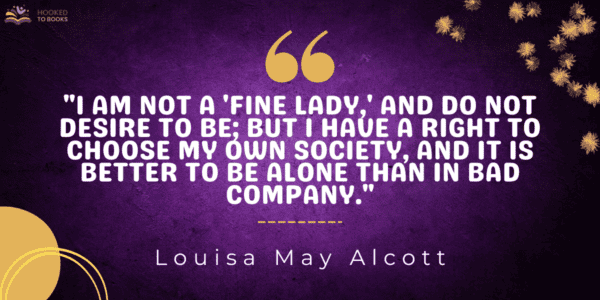
This quote conveys a powerful message about the importance of choosing one’s companions wisely.
It declares that while she may not aspire to be seen as a high-society woman, she values her right to select the people she associates with.
This quote emphasizes that it’s preferable to be alone, enjoying one’s own company, than to be surrounded by negative or harmful individuals.
It underscores the significance of maintaining self-respect and safeguarding one’s well-being by avoiding toxic or undesirable company.
In essence, it encourages us to prioritize our personal happiness and mental peace by selecting companions who uplift and enrich our lives rather than settling for harmful or negative influences.
“I like good strong words that mean something.”
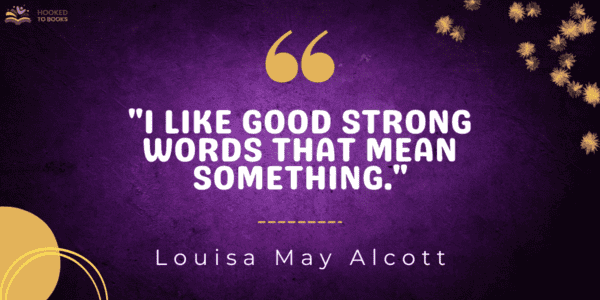
The quote celebrates the richness and power of clear, meaningful language. It expresses a preference for words that carry weight and significance.
In a world filled with noise and superficiality, this quote reminds us of the value of honest and impactful communication. It encourages us to choose our words carefully, aiming for depth and clarity in our expressions.
When we use words that “mean something,” we foster better understanding, connection, and authenticity in our interactions.
It’s a reminder to appreciate the beauty of language that can convey thoughts, feelings, and ideas with precision and depth, making our communication more meaningful and impactful.
“It takes people a long time to learn the difference between talent and genius, especially ambitious young men and women.”
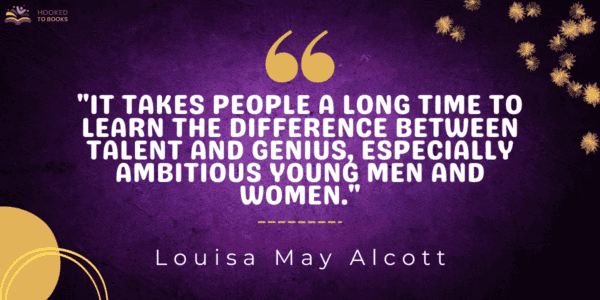
Louisa May Alcott’s quote sheds light on the distinction between talent and genius, particularly in the context of ambitious youth.
It suggests that many people, especially those with big dreams and aspirations, may initially struggle to discern the disparity between these two attributes.
Talent can be seen as a natural aptitude or skill in a particular area, while genius encompasses exceptional creativity and innovation that can redefine entire fields.
This quote reminds us that recognizing this difference often takes time and experience. It encourages young individuals to be patient with themselves as they develop their talents and potentially discover their genius over time.
It’s a reminder that greatness can evolve and mature, urging us not to rush the journey of self-discovery and growth.
“I am not a heroine. I am a plain, blunt, practical servant of my fellow citizens. I cannot possess talents, but I can serve.”
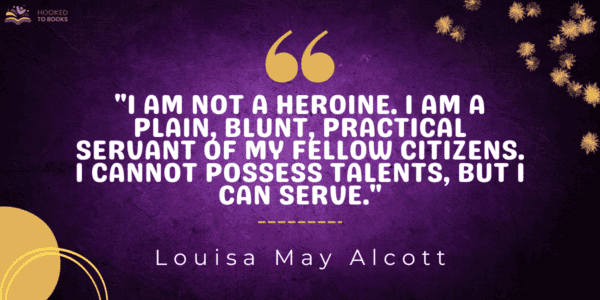
It beautifully conveys the essence of humility and the noble virtue of service. By stating that she is not a heroine or someone endowed with extraordinary talents, she highlights the value of down-to-earth, practical contributions to society.
In these words, Alcott celebrates the idea that anyone, regardless of their perceived talents or abilities, can make a meaningful impact through selfless service to others.
It’s a reminder that the most profound and lasting legacies are often built on acts of kindness, empathy, and dedication to the well-being of fellow citizens.
This quote inspires us to embrace our role as humble servants of our communities, recognizing that our service can enrich lives and create positive change.
“Far away there in the sunshine are my highest aspirations. I may not reach them, but I can look up and see their beauty, believe in them, and try to follow where they lead.”
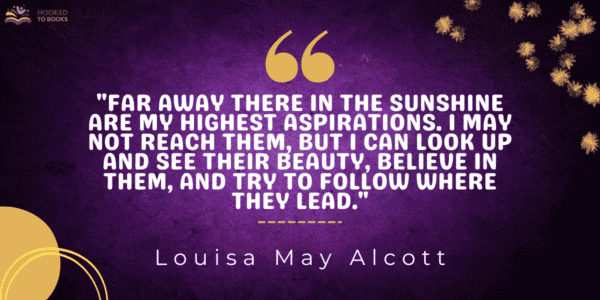
The quote is a testament to the enduring power of dreams and aspirations. It conveys that even if we can’t always attain our loftiest goals, we can still find inspiration and purpose in pursuing them.
The quote encourages us to gaze towards our highest aspirations, like distant sunbeams, and appreciate their inherent beauty.
While the journey to achieve them may be challenging and uncertain, the mere act of believing in our dreams and striving to follow their path imbues our lives with meaning and direction.
It reminds us that aspirations are not solely about reaching the destination but also about the growth, hope, and determination they instill within us along the way.
“I am not belittling the brave pioneer men but the sunbonnet as well as the sombrero has helped to settle this glorious land of ours.”
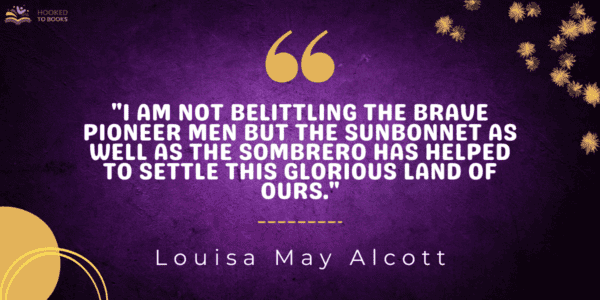
It acknowledges the significant, yet often overlooked, role of women in the settlement and development of their country. She compares the sunbonnet, a symbol of women’s work and presence on the frontier, to the sombrero worn by men.
In these words, Alcott highlights that both men and women played essential roles in building their nation. While men may have taken more visible roles, women’s contributions, symbolized by the sunbonnet, were equally vital.
They labored alongside men, taking care of homes, families, and farms, which were crucial for the success of pioneering efforts.
Alcott’s quote celebrates the unsung heroines who, through their hard work and dedication, helped shape and settle their beloved land.
It’s a reminder that history is often enriched by the stories of those who work behind the scenes.
“Girls are so queer you never know what they mean. They say No when they mean Yes, and drive a man out of his wits for the fun of it.”
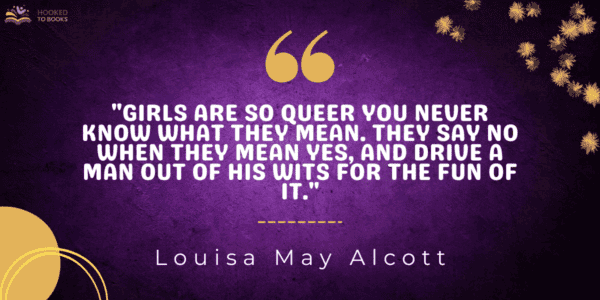
Louisa May Alcott’s quote playfully explores the idea that girls, like anyone, can sometimes be mysterious in their communication.
It suggests they might say “No” when they actually mean “Yes” and enjoy the playful banter that can leave someone puzzled.
In a lighthearted way, the quote touches on the complexities of human interaction, where words may not always directly convey feelings or intentions.
It’s a reminder that understanding one another can be an enjoyable and sometimes challenging part of relationships.
Ultimately, it encourages us to approach communication with patience, empathy, and a sense of humor, appreciating the unique ways people express themselves, even if it sometimes seems a bit perplexing.
“Let my name stand among those who are willing to bear ridicule and reproach for the truth’s sake, and so earn some right to rejoice when the victory is won.”
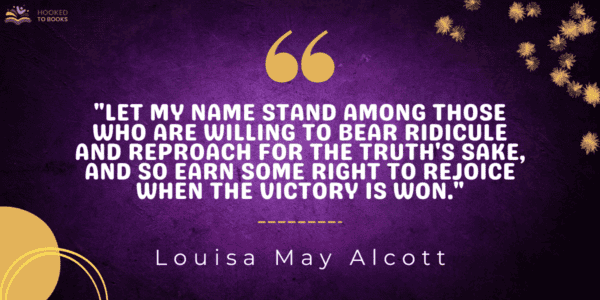
This quote embodies a noble aspiration for integrity and courage. It expresses a desire to be counted among those willing to endure criticism and scorn while standing up for what is true and just.
In these words, Alcott emphasizes the importance of moral strength and resilience. She suggests that enduring ridicule and reproach for the sake of truth is a worthy endeavor.
By doing so, one not only upholds their principles but also earns the right to celebrate when justice prevails.
This quote inspires us to be steadfast in our commitment to truth and righteousness, even in the face of adversity, knowing that our actions contribute to a better world and ultimately lead to victory and rejoicing.
“Have regular hours for work and play; make each day both useful and pleasant, and prove that you understand the worth of time by employing it well. Then youth will be delightful, old age will bring few regrets, and life will become a beautiful success.”
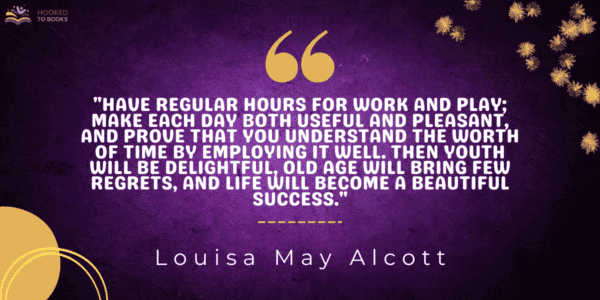
This quote offers a valuable lesson in time management and balanced living. It encourages us to establish a structured routine that includes dedicated time for both work and leisure.
By doing so, we can lead fulfilling lives where each day is a combination of productivity and enjoyment.
It emphasizes the importance of using our time wisely and efficiently, highlighting that a well-organized life can lead to happiness in youth and contentment in old age.
Ultimately, Alcott’s quote reminds us that a life well-lived is one that finds a harmonious balance between responsibility and pleasure, ensuring that we make the most of our time and create a beautiful and successful journey through the years.
“I’d rather have roses on my table than diamonds on my neck.”
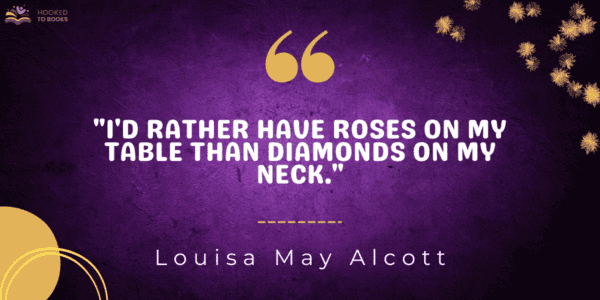
The quote expresses a profound preference for the simple and meaningful over the extravagant and materialistic.
It signifies that she values the beauty of fresh, fragrant roses adorning her table more than the luxury of diamonds around her neck.
In these words, Alcott emphasizes the significance of appreciating life’s natural and fleeting pleasures. It suggests that genuine happiness and fulfillment can be found in the small, everyday moments and connections symbolized by the roses.
The quote encourages us to prioritize the richness of experiences and relationships over material possessions, reminding us that the true treasures in life are often those that touch our hearts and senses rather than adorn our bodies.
“Life is my college. May I graduate well, and earn some honors!”

It paints life as a continuous journey of learning and growth. It likens life to a college, implying that every experience, challenge, and lesson encountered is an opportunity for personal development.
In these words, Alcott expresses a heartfelt aspiration to excel in the “school of life” and be recognized for her achievements.
It encapsulates the idea that our time on Earth is a valuable education where we gather wisdom, empathy, and resilience through our experiences.
This quote encourages us to approach life with a thirst for knowledge and self-improvement, striving to graduate from life’s lessons with honors – not in the traditional sense, but in the form of personal growth, wisdom, and well-lived life.
Wind-Up
Louisa was a great writer who, despite all her hardships during that era and society’s restrictions toward women, was able to gain success through her determination.
I always get inspired thinking about her story, and I’m sure many women around the world do. Little Women is one of my favorite books!
I hope the quotes reminded you of Louisa and her works. What’s your favorite quote by the author?



